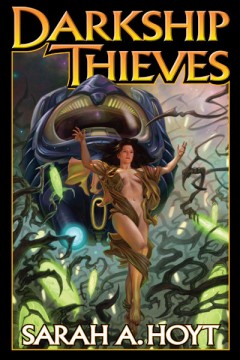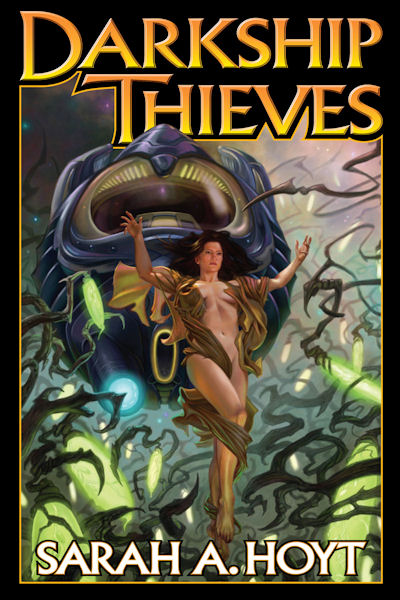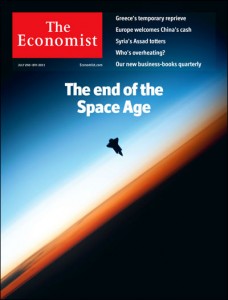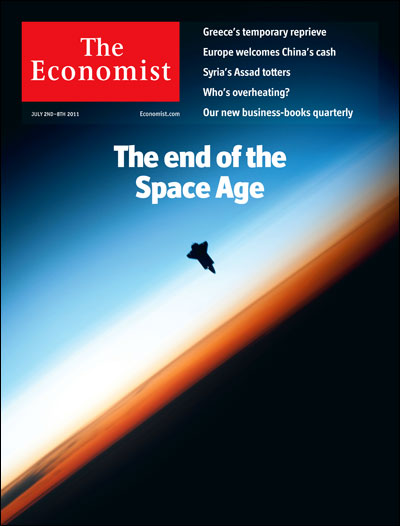- From Mike P. over at The Emptiness comes “Socialism: A love story — Star Trek,” in which he discusses his love affair with Star Trek and how realizing it’s a utopian socialist fantasy actually makes the show more enjoyable.
- From SF Signal comes news that the Hugo Award–winning Encyclopedia of Science Fiction, edited by John Clute and Peter Nicholls, is receiving a long-awaited update to its third edition (the last, second, edition was published in 1993) and — wait for it — is being made available for free online. Why? Oh, I don’t know, maybe reading through the encyclopedia will tempt people into buying more books and ebooks of and about the stories and authors described within it. And simply keeping the history of the genre alive and readily accessible to future generations is a worthy endeavor in itself, of course.
From the press release:The third edition of the Encyclopedia of Science Fiction, the definitive reference work in the field, will be released online later this year by the newly-formed ESF, Ltd, in association with Victor Gollancz, the SF & Fantasy imprint of the Orion Publishing Group, whose support will enable the text to be available free to all users. This initial “beta” version, containing about three-quarters of the total projected content, will be unveiled in conjunction with Gollancz’s celebrations of its 50th anniversary as a science fiction publisher.
[continue reading…]
News
NEWS ROUNDUP | Trek Socialism, SF Encyclopedia Online, Innovations in Publishing
in News, Prose, Science Fiction, Technology, TV
Help Promote Prometheus Unbound by Sharing this Post

 The Libertarian Futurist Society has announced this year’s winners of their Best Novel and Hall of Fame awards.
The Libertarian Futurist Society has announced this year’s winners of their Best Novel and Hall of Fame awards.
- Best Libertarian Novel Winner: Darkship Thieves by Sarah Hoyt (Baen).
- Hall of Fame Winner: Animal Farm by George Orwell.
Alas, I didn’t get around to reading and reviewing Cory Doctorow’s For the Win in time for the voting, but I still plan on doing so. Matthew Alexander reviewed another of the finalists, L. Neil Smith’s Ceres.
Here’s the official press release:
The Libertarian Futurist Society will hold its annual awards ceremony for the Prometheus Award during Renovation, the 69th World Science Fiction Convention, to be held Aug. 17-21 in Reno, Nevada. The specific time and location will be available in the convention program.
The winner of the Best Novel award is Darkship Thieves, by Sarah Hoyt (Baen Books). The Hall of Fame award was won by Animal Farm, a short novel written by George Orwell in 1945. Sarah Hoyt will receive a plaque and a one-ounce gold coin, while a smaller gold coin and a plaque will be presented to Orwell’s estate.
Darkship Thieves features an exciting, coming-of-age saga in which a heroic woman fights for her freedom and identity against a tyrannical Earth. Hoyt’s novel, dedicated to Robert A. Heinlein, depicts a plausible anarchist society among the asteroids. Hoyt is a prolific writer of novels and short fiction, though this is her first time as Prometheus finalist.
Help Promote Prometheus Unbound by Sharing this Post

So announces the cover of the July 2nd – 8th issue of the Economist.
I’m not privy to what angle the article or articles will take, but I presume the cover is referring to the retirement of NASA’s space shuttle program without a government replacement. But why need that mean the end of the space age?
Help Promote Prometheus Unbound by Sharing this Post
NEWS ROUNDUP | Douglas Adams vs. Ayn Rand, Digital Publishing, Tablets & Ereaders
in IP, News, Prose, Science Fiction, Technology
- Brian Defferding (?) over at Practical Praxeology tells us “Why The Hitchhiker’s Guide to the Galaxy is Better Atheist Libertarian Literature than Any Ayn Rand Book.” Do you agree?
- Digital publishing, tablets, ereaders, and the changing genre publishing landscape:
- Wired – Epicenter: “Digital Book Publishing Models to the Rescue.” A few of the interesting business models that are emerging, including J.K. Rowling’s for the ebooks of the Potter series.
- Wired – Epicenter: “Are Tablets Killing E-Readers? Um, No….”
- Adventures in Scifi Publishing podcast #124: Fascinating interview with multi-genre author Kristine Kathryn Rusch about how digital publishing is changing the genre publishing landscape and stirring up controversy: outdated accounting practices, publisher undercounting of ebook sales, shady new agent practices (including one mentioned in the first Wired article above) and whether you even need or should get an agent now, publishing and agent contracts, foreign rights, ebook rights, IP lawyers, and so on. If this podcast episode piques your interest, be sure to check out Kris’s Business Rusch series of blogposts for more on these topics.
Help Promote Prometheus Unbound by Sharing this Post
The Seasteading Institute, dedicating to “homesteading” and living on the seas, is having a short story contest. Winners will have their stories featured on the institute’s website.
From their press release:
Help Promote Prometheus Unbound by Sharing this Post
INTERVIEW | Jennifer Burns on Ayn Rand and the Classical Liberal Tradition
in Film, Interviews, News, Novels
With the recent release of the first part of the film adaptation of Atlas Shrugged (see Matthew’s review), the Institute for Humane Studies (IHS) — via LearnLiberty.org — brings us this interview with Professor Jennifer Burns, author of Goddess of the Market: Ayn Rand and the American Right, on how Ayn Rand fits into the classical liberal tradition.
In this video, Prof. Burns explains three classical liberal themes in Ayn Rand’s masterpiece Atlas Shrugged: individualism, suspicion of centralized power, and free markets. These themes come to life through the novel’s plot and characters and give the reader an opportunity to imagine a world where entrepreneurship has been stifled by regulations and where liberty has been traded for security. Burns ends by reviving Rand’s critical question: do you want to live in this kind of world?
Help Promote Prometheus Unbound by Sharing this Post
WHAT IF | Hayek and Keynes could debate the current financial crisis…in verse?
in Fantasy Fiction, History, Music, News, Poetry, Science Fact, Science Fiction, Statism
It might be something like this fantastic new rap video produced by John Papola and Russ Roberts as part of their EconStories.tv project, “Fight of the Century: Keynes vs. Hayek Round Two“:
One of these days I’ll write an article on why fiction authors, especially science fiction authors (hellooo!), should study the “dismal science.”
Help Promote Prometheus Unbound by Sharing this Post









